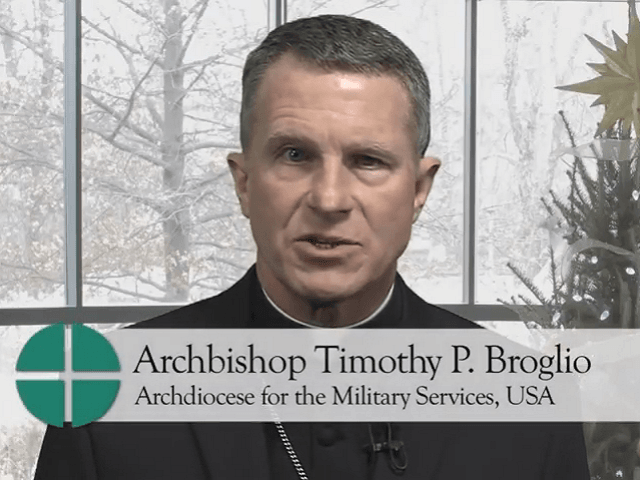The Catholic Archbishop for the Military Services issued a statement this week defending President Trump’s reinstatement of a policy disqualifying transgender individuals from military service, noting that “gender ideology undermines basic Christian anthropology.”
Archbishop Timothy P. Broglio cited the President’s reasons for the ban including “a detriment to military readiness and the cost associated with gender reassignment surgeries and therapies,” but suggested that the underlying issue goes even deeper than those real but pragmatic concerns.
While “military readiness is of utmost importance to our servicemen and women who selflessly risk personal safety to defend the values and freedoms of our Nation,” Broglio wrote, the “essence of the issue” goes to the heart of the dignity of the human person.
“The dignity of the human person is rooted in the fact that people are created in the image and likeness of God – God who in the fullness of his divinity assumed humanity to redeem the world,” Broglio said.
The Military Archbishop, in charge of all Catholic military chaplaincies, quoted from a recent conference, titled “Framing a Catholic Response to Gender Ideology,” which declared that “gender ideology undermines basic Christian anthropology by defining the person as a disembodied mind and the body as a mere instrument.”
“Sexual orientation and gender identity issues reflect a rapidly increasing and incorrect societal attitude that individual behaviors in life should pursue immediate and personal choices rather than eternal truth,” Broglio stated.
Whenever making personal choices, he said, the bigger issues of the meaning of human existence must be addressed.
It is opportune “to reaffirm that personal choices in life, whether regarding the protection of the unborn, the sanctity of marriage and the family, or the acceptance of a person’s God-created biology, should be made not solely for a penultimate reality on this earth but in anticipation of the ultimate reality of sharing in the very life of God in heaven,” he said.
Broglio’s words echoed similar expressions on gender ideology penned by Pope Francis in his 2015 encyclical letter Laudato Si’. In it, the Pope condemned the relativism at the heart of gender theory and urges those struggling with gender identity issues to accept their bodies as God made them.
“The acceptance of our bodies as God’s gift,” Francis wrote, “is vital for welcoming and accepting the entire world as a gift from the Father and our common home, whereas thinking that we enjoy absolute power over our own bodies turns, often subtly, into thinking that we enjoy absolute power over creation.”
In the framework of responsible stewardship for creation, Francis suggested, the manipulation of gender implies an assault on the Creator and a disrespect for his designs.
Shortly after the publication of the Pope’s letter, the Vatican reaffirmed the binary male-female distinction of human beings, banning transgender persons from being godparents posing as the opposite sex from which they were born.
The case that came to the attention of the Vatican’s Congregation for the Doctrine of the Faith involved a 21-year-old transgender person from Cádiz, Spain. Alex Salinas was born a girl but as of February 2014 holds an ID card identifying her as a male. At the time, Alex was on a waiting list to receive sex reassignment surgery.
When Alex applied to be the “godfather” of her nephew, the local bishop sent a consultation to the Vatican’s doctrinal office, asking what to do in this case.
The Vatican Congregation responded that beyond the obvious problem with a female wishing to present herself as a “godfather,” there were other moral issues at play as well, since “transsexual behavior publicly reveals an attitude contrary to the moral imperative of resolving the problem of one’s sexual identity according to the truth of one’s sexuality.”
The Congregation said that discrimination had nothing to do with its refusal to allow Alex to sponsor her nephew, but rather based its decision on “the lack of the qualities needed to assume the responsibility of being a godparent in the Church.”
Follow Thomas D. Williams on Twitter Follow @tdwilliamsrome

COMMENTS
Please let us know if you're having issues with commenting.